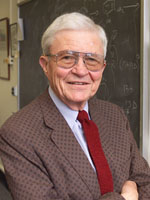
Fred W. McLafferty
Cornell University
GC: Gordon Conference or Gas Chromatography?
I started attending Gordon Research Conferences in the early 1950s–mainly the Analytical Chemistry Conferences. I was then working on mass spectrometry in the Dow Chemical Company Spectroscopy Laboratory in Midland, Michigan. The Analytical Chemistry Conference in 1954 was particularly memorable, as it was there that I heard about gas chromatography (GC) for the first time. The talks on GC by Steve Dal Nogare of DuPont and H. N. Wilson of ICI (Imperial Chemical Industries) were so exciting that I could hardly think of anything else. I spent much of the remaining free time asking them questions. I was even lucky enough to take the train back to Boston with them, filling a notebook on how to build such an instrument, how to pack columns, where to buy a detector, and so forth. Although I lost track of Wilson, Steve was always willing to provide solutions to problems and was a very good friend until his tragic death.
As soon as I got back to the laboratory in Midland, Roland Gohlke took over the gas chromatograph construction project with high enthusiasm and unusual creative energy. He soon not only had a working instrument, but he also found so many immediate applications at Dow in both research and production that he began “manufacturing” gas chromatographs. His innovations included putting the instruments inside a one-gallon Dewar vessel for temperature control, packing columns with Tide detergent, and persuading the Gow-Mac Instrument Company to make a special detector. His product was so successful that he placed two hundred of his instruments at Dow before instrument companies began competing in gas chromatograph production.
Gohlke’s gas chromatograph was also the first to be directly coupled to a mass spectrometer (MS) that could measure the mass spectrum of an eluted fraction in real time. In February 1956 Roland and I drove a gas chromatograph and samples from Midland down to the Bendix Research Laboratories in northern Detroit where William C. Wiley and Ian H. McLaren had developed the first commercial time-of-flight (TOF) MS. As described by Wiley, Dan Harrington, Roland, and myself in the
Journal of the American Society for Mass Spectrometry in 1993, the TOF MS measured mass spectra at a 10-kilohertz repetition rate, displayed on an oscilloscope and recorded by a Polaroid camera. For the first GC-MS run, however, Roland called out each compound immediately as its mass spectrum was displayed, a technique he described in
Analytical Chemistry in 1959.
Although corporate secrecy in analytical techniques is not as important as it is in product manufacturing, DuPont and Dow were broad-minded in encouraging the open communication that made the Analytical Chemistry Gordon Conferences highly valuable. When I asked Ray Boundy, then Dow’s director of research, about this he laughed and said, “After all, DuPont is our best customer.” Improving communication was also a major objective of Dow’s in establishing their Eastern Research Laboratory outside of Boston, and in June 1956 I was sent there as its first director to set it up. Of course the laboratory’s contribution to Dow research was directly related to its success in keeping up with the best in science. An important long-term benefit to Dow was also the hiring and development of scientists with excellent skills in research and communication.
It is critically important to keep reexamining the efficiency of the scientific enterprise, finding ways to get more results from research and development in various fields, and better communication is a key factor in this objective. Complaints about inadequate communication are often heard in the scientific community, such as “meetings are too large,” “it is hard to talk to people,” “we didn’t become well enough acquainted to really discuss things,” and “if only we had more time.” Available for more and more fields every year, the Gordon Research Conferences are the solution.